Search
Showing 10 of 498 results for group registration
-
Record audience for ECE symposium streamed live from China
Thousands watched the third annual New Zealand – China Early Childhood Education Symposium, as it was livestreamed from Guilin in southern China on 23 September 2022. A further 200 attendees were present at the event in Guilin, and New Zealand presenters and attendees joined via webinar.
Sponsored by Education New Zealand Manapou ki te Ao (ENZ), the New Zealand Embassy in China, and the China Centre for International People to People Exchange, and co-organised by Guangxi Normal University, the 2022 Symposium’s theme was: Together for a Shared Future: Sustainable Development in Early Childhood Education and Care.
Thought-provoking and inspirational presentations covered a wide range of topics, including education systems, language development and practical examples of play-based learning. You can view the 2022 ECE Symposium programme, including details of the presenters, here.
Miranda Herbert at a media engagement with Chinese news channels
Miranda Herbert, ENZ’s Regional Director for Greater China was invited to an interview with Guilin TV to explain our collaboration with China’s Ministry of Education, to support dialogue around best practice in the early childhood education field. The event was also covered by other key news outlets in China, including Guangming Daily, a national Chinese-language daily newspaper published in the People's Republic of China.
“New Zealand is recognised as one of the first partners with China for early childhood education, as a result of the symposium,” Ms Herbert said.
“Now in its third year, the symposium has grown from strength to strength each year, and is highly valued by the Ministry of Education in China.”
Representatives from Te Rito Maioha presented a talk on the theme 'My language and my culture are my identity'.
Arapera Card, Senior Advisor Māori at Te Rito Maioha, said meeting the organisers both from Beijing and Aotearoa set a sense of whanaungatanga and manaakitanga ahead of the symposium.
“As an organisation Te Rito Maioha found this experience to be overall well executed and amazed at the number of participants across China. That was lovely to see, and should the opportunity come around again, we will be sure to increase the numbers of participants attending from Aotearoa. The line-up of presenters from both countries absolutely showed that the early childhood sector is in good hands,” Ms Card said.
New Zealand and China have been collaborating on early childhood education since 2020 and this is now an item under the mechanism of the Joint Working Group on Education and Training, last held in February 2021.
Want to know more about ENZ initiatives in China? Contact China@enz.govt.nz
-
High level of interest in vocational education forum
Organised by Skills Consulting Group and Education New Zealand Manapou ki te Ao (ENZ), together with Te Pūkenga, the forum provided an opportunity to share knowledge and insights on best practice in technical and vocational education and training, in an accessible format.
A key theme was the importance of close relationships with industry, particularly in terms of apprenticeships. For some participants, a longstanding perception that higher education is more important than vocational education remains a challenge. Student panel participants also talked about the confidence and support that their parents provided when they were making decisions about whether to enter vocational education programmes, and having no regrets about the career paths followed.
Topics covered included solving skills shortages, apprenticeships, youth employment, lifelong learning, digital transformation, sustainability, and promoting diversity. Senior government officials, major companies, international organisations, sector leaders and students from around the world spoke at the forum, which was opened with a speech from Education Minister Chris Hipkins.
Text-based chat and discussion tools in the virtual environment were multilingual, providing instant translation to enable communication and networking across 28 different languages.
The China – New Zealand Higher Vocational Education Summit was also part of the APAC TVET Forum and featured a dedicated virtual room for Chinese presenters and audience members. The Summit provided a platform to:
- discuss New Zealand’s recent experience of vocational education reform
- further develop cooperation in vocational education between New Zealand and China, building on the existing joint programmes between Te Pūkenga subsidiaries and vocational institutions in China.
Keynote speakers from China included Chen Dali, Deputy Director, General Department of International Cooperation and Exchanges from the China Ministry of Education, and presenters from industry including Wang Jinsheng from Qingdao Technical College.
ENZ Business Development Manager Richard Kyle says APAC TVET is the only forum of its type in the region.
“It was particularly encouraging to see double the number of registrations this year, building on the success of the first forum in 2021. There’s clearly a high level of interest in this event, and it’s a great opportunity to showcase New Zealand’s strengths in vocational and technical education.”
Positive comments were received from many attendees.
“Brilliant tech. Excellent management…and good content.”
“Amazing numbers... Very informative sessions and I’ve got people more interested in our upcoming activities.”
“It was well organised from the invitation to the closure of the forum – well done job!”
-
Haere rā to Brazilian students
Farewell events for the students have been held around the country, to demonstrate our appreciation of this opportunity, and contribute to the students’ memories of New Zealand. The events also provided an opportunity for diplomats from both countries, and local government representatives to demonstrate the value of international education in building global connections and long-term relationships.
Events included a sailing trip with Maritime New Zealand, Māori performances, outdoor experiences, and museum tours, organised by Education New Zealand Manapou ki te Ao (ENZ) alongside regional development agencies.
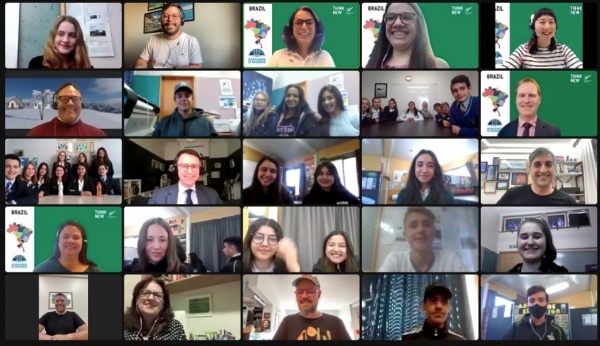
Final farewells from students and their supporters in New Zealand and Brazil.
The final farewell event was online, and included New Zealand Ambassador to Brazil Richard Prendergast, Henrique Choer Moraes, Minister-Counsellor at the Brazilian Embassy in Wellington, and Mr. Roni Miranda Vieira, Director of Education from the Education Secretariat of Paraná state speaking with the students and hearing about their experiences, alongside others involved with the trip.
‘The people were very welcoming – a wonderful experience.’
‘New Zealand is beautiful, this is the best experience of my life, I’m loving it here!’
‘We got to know so many places.’
‘A lovely country and a lovely experience – thank you so much.’
‘We did a boat cruise in Milford Sound.’
‘We went with the school to a lot of different places.’
‘I had a really great time with my host family. They were very kind to me. I’m very sad to leave them.’
‘I’m getting on very well with my host brother – I think I will miss him when I go back to Brazil.’
‘It has been an amazing experience – I am learning so many things.’
‘My host family owns a coffee shop in Rangiora where I go on weekends and have a chance to know different people, they also own a farm and have taught me how to shear a sheep. Another interesting thing I noticed is that depending on the city, I hear a different accent.’
ENZ’s Market Development Manager in Brazil, Bruna de Natale, says this was the first big group of students to come to New Zealand after our borders reopened.
“We had all been waiting eagerly for New Zealand’s borders to open again so this programme could get underway after almost two years, and I know the Kiwi schools involved were very excited to welcome these students. It was good to hear about the special memories the students will take home from their trip, including how much they learned. For most students, this was their first international experience and for many of them, being in a multi-cultural class in New Zealand was a very different experience from home.
“We hope that the students will stay connected to New Zealand and that this experience will be a good basis and incentive for them to explore further international study options in the future – who knows, we might welcome them back to New Zealand someday, that would be lovely!”
The study programme is fully funded by the Paraná Government, through Paraná’s Secretary of Education and Sport, and is expected to continue next year for around 2,000 students. We hope that some of them will be able to come to New Zealand.
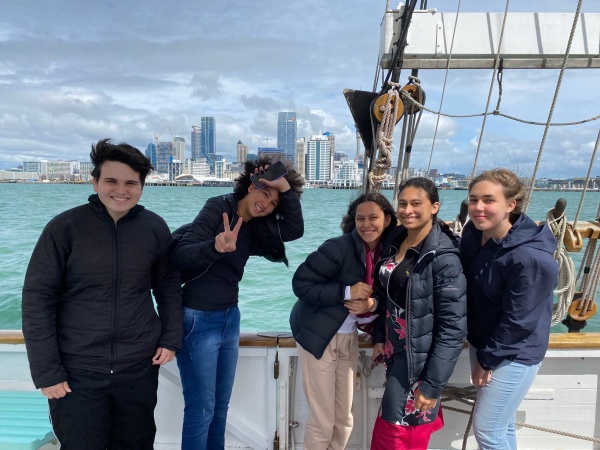
Auckland-based students took part in a sailing trip thanks to Maritime New Zealand and Auckland Unlimited
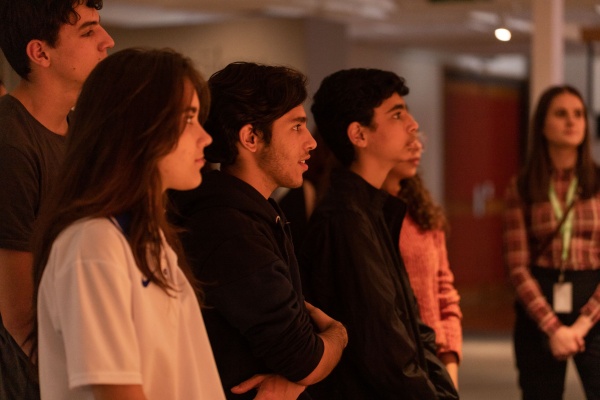
Students from Freyberg High School saw a presentation on the Iny͂ People of Central Brazil exhibition at Te Manawa Museum in Palmerston North
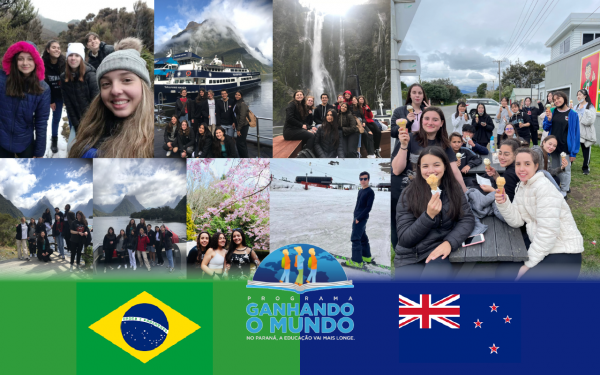
Visiting Milford Sound was one of the highlights for the Invercargill-based students
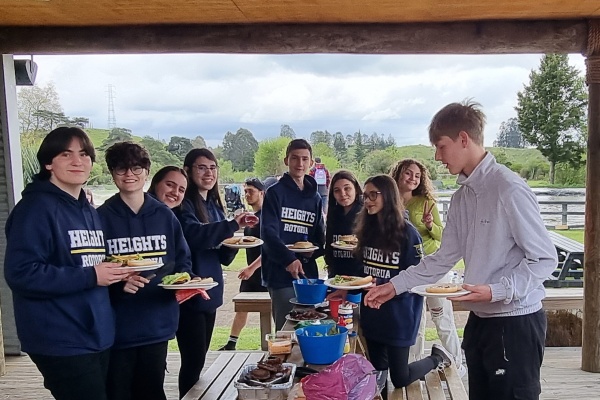
Students from Western Heights High School experienced a farewell special day out in Rotorua that included Velocity Valley, ZORB, and the Skyline Rotorua Gondola and Luge, as well as a BBQ lunch.
-
Getting to know the Chinese government education agencies
To introduce Michael Zhang, incoming Regional Director Greater China and to farewell outgoing director Miranda Herbert, the China team at Education New Zealand Manapou ki te Ao (ENZ) met with key education agencies in Beijing in October 2022.
“The meetings were an opportunity to reaffirm the long-term good relationship between New Zealand and Chinese government education agencies,” Michael Zhang says.
“We were able to share updates about recent work, hear from each agency about their plans, and discuss possible opportunities for future collaboration with New Zealand institutions.”
Ministry of Education, People’s Republic of China (MoE)
The Ministry of Education is the key government body responsible for the development of China’s education system, from early childhood education through to higher education. Key focus areas include the development of national strategies, policies and plans for education reform and development.
The Department of International Cooperation and Exchange coordinates the Ministry’s engagement with foreign countries. The Department’s key functions include:
- Managing and guiding international education cooperation and exchanges
- Drafting guidance and policies for the management of Chinese students studying abroad, international students studying in China, Chinese-foreign cooperative joint ventures and schools for foreign children
- Supervising international cooperation and exchanges in the education sector
- Guiding the work of education departments/divisions in Chinese embassies/consulates
- Planning, coordinating and guiding the teaching of Chinese as a foreign language
- Conducting educational cooperation and exchanges with the Hong Kong Special Administrative Region, the Macao Special Administrative Region and Taiwan Region of China.

L to r: Rosemary An (ENZ), Kieran Knight (MFAT) Director You Jia (China MoE), Deputy Director-General Chen Dali (China MoE), Director-General Liu Jin (China MoE), H.E. Clare Fearnley (NZ Ambassador to China), Michael Zhang (ENZ), Miranda Herbert (ENZ)
New Zealand’s Ambassador to China, Clare Fearnley, hosted a lunch on 27 October 2022, for China Ministry of Education Director-General Liu Jin and his team, in partnership with ENZ.
Both sides emphasised the value and warmth of the bilateral education relationship, underpinned by a long history of cooperation and several recent milestones despite the challenges of COVID.
There was strong interest to build on the positive ministerial engagement in August and the upcoming 10th Joint Working Group in late November, including hopes for high-level visits next year in both directions. Opportunities to engage with China MoE include high-level visits, and policy advice through ENZ’s China team.
Chinese Service Centre for Scholarly Exchange (CSCSE)
Initially founded in 1989, CSCSE is a public organization under China Ministry of Education (MOE). CSCSE specialises in offering professional services for international scholarly exchanges, including Chinese students and scholars studying abroad, returnees from overseas, and international students and scholars coming to study in China.
CSCSE is also dedicated to promoting the internationalisation and capacity-building of Chinese higher education institutions, as well as improving education resources through international exchanges and collaboration.
CSCSE is the only official organisation that provides overseas credential evaluation and recognition services in China. The statement of comparability of overseas qualifications issued by CSCSE is widely recognised by Chinese employers and institutions from various sectors. CSCSE is an active member in the international education community, facilitates global talent mobility and improves international recognition of qualifications. CSCSE has long-term partnership with foreign qualifications authorities, including NZQA.
CSCSE manages and executes the China International Education Exhibition Tour (CIEET), which New Zealand has regularly attended in past years. CSCSE also organises the China Study Abroad Forum in March each year, in which ENZ is a regular speaker and participant.

L to r: Xu Chenxing (CSCSE), Director Yu Haiying (CSCSE), Miranda Herbert (ENZ), Deputy Director-General XIA Jianhui (CSCSE), Michael Zhang (ENZ), Rosemary An (ENZ)
Opportunities to engage with CSCSE include student recruitment fairs, study in China, international conferences, verification of foreign credentials, and transnational education programmes.
China Education Association for International Exchange (CEAIE)
CEAIE was founded in 1981 as a not-for-profit organisation to encourage international exchange and cooperation. It is a key organisation in facilitating foreign engagement with the Chinese education system.
Headquartered in Beijing, it has provincial associations for international exchange in 31 provinces, autonomous regions and municipalities in China, as well as local chapters in 16 major cities. It has relationships with more than 170 education organisations in more than 50 countries (including Universities New Zealand). CEAIE has been granted Special Consultative Status with the Economic and Social Council of the United Nations and has established official relations with UNESCO.
Every year in October, CEAIE organizes the China Annual Conference for International Education (CACIE), and the China Education Expo (CEE) both of which ENZ attends. New Zealand was designated Country of Honour at the 2015 conference and expo, which has provided remarkable marketing exposure for New Zealand education. Miranda Herbert from ENZ attended CACIE in October 2020 as a VIP guest and delivered a keynote speech, and in 2021 received a prestigious award recognising ENZ as an ‘outstanding international partner’. Among its activities, CEAIE supports major people-to-people dialogue and exchange mechanisms with partner countries and provides quality assurance services for China-Foreign cooperative transnational education programmes.
Currently, there is strong collaboration between the New Zealand education sector and CEAIE, and their initiatives across various sectors. The university sector held the 5th NZ-China Higher Education Forum with the support of Universities New Zealand and CEAIE on 10 November 2022. CEAIE also expressed interest in collaborating with the New Zealand school sector around Sister School Programmes and exploring opportunities to facilitate Leadership and Capacity building. ENZ is following up with CEAIE on the leadership opportunities and plans to run an Expressions of Interest process once more details are available.
Opportunities to engage with CEAIE include student recruitment fairs, conferences, school cooperation, training, and Quality Assurance for joint programmes.
Positive meetings were also held with other agencies affiliated to China MoE, including the China Center for People-to-People International Exchange (CCIPE) and China Scholarship Council (CSC).
CCIPE highlighted the growing strength and success of our Early Childhood Education Symposium, while CSC emphasised their desire to see increased numbers of Chinese scholarship students choose New Zealand for their studies, particularly at PhD level. All eight New Zealand universities have signed MOUs with CSC. New Zealand students can also study in China on fully-funded scholarships, by applying directly through CSC. There are programmes in English and Chinese: CSC Scholarships | China Scholarship Council | Chinese Government Scholarships (chinesescholarshipcouncil.com)
-
Prime Minister’s Scholarships to study in Asia and Latin America announced
Education New Zealand Manapou ki te Ao (ENZ) Chief Executive Grant McPherson, today announced the names of 111 New Zealanders who will travel to destinations in Latin America and Asia for an international education experience on a Prime Minister’s Scholarship for Asia (PMSA) or Latin America (PMSLA).
Funds awarded for individuals in this scholarship round total $1.5 million.
The individual recipients are the second round of scholarships to be announced this year. The earlier round of scholarships was awarded to groups.The recipients will undertake study, research and internship programmes in fields such as business, language, indigenous rights, sustainable development and architecture for a minimum period of four weeks (Latin America) and six weeks (Asia) up to two years. The top Latin America study destinations for this round are Chile and Colombia, with Japan and the Republic of Korea most popular destinations in Asia among scholars.
“The merit of our scholarship applicants continues to be impressive – we are proud to offer this opportunity for people to develop their inter-cultural skills, build networks and enjoy experiences abroad,” said McPherson. “We know they will make us proud to have them representing New Zealand in this important time of rebuilding and reconnecting with overseas partners.”
“Interest for this programme continues to grow, building collective skills and understanding of different cultures helps our country show leadership in matters of significance for Asia and Latin America regions.”
Māori Participation lifts significantly
A group of Māori Prime Minister’s Scholarship alumni, Te Kāhui Kaupapa, have been working to raise access and participation for Māori. Participation in this round increased to 22% for PMSA and 17% of PMSLA recipients, compared to an average of 5% for PMSA and 8% for PMSLA rounds in 2016 to 2019. This is part of a wider programme of work to ensure the scholarship programme is more accessible to all New Zealanders over the age of 18, and that it delivers on our Te Tiriti obligations.
The Prime Minister’s Scholarship programme aims to strengthen New Zealand’s ability to engage with key Asian and Latin American trading partners, improving the internationalisation of indigenous communities, New Zealand tertiary institutions, showcasing the strength and quality of New Zealand's education system and enhancing inter-cultural awareness and connections between New Zealand and other countries. The scholarship offers flexible funding to support both short and long-term programmes including study abroad / exchange, internships, postgraduate study, and language programmes.
The scholarships programme is funded by the New Zealand Government and administered by ENZ.
The PMSA was launched in 2013 and extended to Latin America in 2016. To date, there have been 2,879 PMSA and PMSLA scholarships awarded.
There are two scholarship rounds each year, and applications for the next individual round will be held in August 2023. Many of the awardees are enrolled in universities across New Zealand, but this is not a requirement for the scholarship. Any New Zealand citizen or permanent resident over 18 can apply for a PMSA or PMSLA.
More information on the application process can be found here.
A full list of this round of scholars can be found here.
-
Indigenous Malyasian students learn about Te Ao Māori
Scholastica Philip, who is of Kadazan descent, together with Diana Bah Said and Norazah Din, both of Semai ethnicity, have been studying the Te Ao Māori and Sustainability course on the Mission New Zealand online platform.
All three say they gained a great deal from the short course, which included an introduction to biculturalism, and the five stages of the design thinking process.
“Biculturalism in Aotearoa New Zealand is fascinating,” Norazah said. “We learned about Māori settling in New Zealand, and I really want to experience their culture and daily life if I have the chance in the future.”
Scholastica noticed some common themes around sustainability in Te Ao Māori, and the importance of nature and food in her Kadazan culture, which is from East Malaysia.
“We take care of nature as we take care of humans - we need to take care of all living things.
“There is an ancient story for Kadazan people about Huminodun, a very beautiful woman who sacrificed herself to create food and bring rain to stop the cursed drought season for her people. This story is about how closely we are connected with nature.
“We learned on the course that Māori and non-Māori are working together in New Zealand to achieve a sustainable ecological system – I love the concept,” Scholastica said.
Norazah and Diana also noted how important trees and rivers are in their distinctive Semai culture, which is based in North Malaysia.
“We have a very strong connection with nature - as much as we respect each other,” Diana said.

Norazah with a friend at the Festival of Langauge

Scholastica and Diana at university in Kuala Lumpur
Norazah and Diana are in their second year of study at Universiti Malaya, and Scholastica is in her third year.
Scholastica has also completed an introductory course in te Reo Māori, and you can hear her pepeha here.
Ben Burrowes, Regional Director Asia for Education New Zealand Manapou ki te Ao (ENZ) says the Whakatipu Scholarships are funded by ENZ and Universiti Malaya.
“We are aiming to empower talented young indigenous students, support them with learning and exchange opportunities, and encourage knowledge sharing.

Scholastica at the Sabah Fiesta with a group of Thai buddies
“This is the first year of the scholarship, and it’s great to see these students making the most of this opportunity.”
Read more about the Whakatipu Scholarships on the ENZ website here.
Read more about Mission New Zealand on ENZ’s New Products and Services website here
-
Reconnecting with stakeholders in Japan
Across the two days, 68 representatives from education and travel agencies, schools, universities and ENZ’s education partners in Japan networked with 19 New Zealand education providers, regional representatives and edtech company, Chasing Time English, and heard updates from ENZ. Networking opportunities included one-on-one meetings, and a reception at iki, a newly opened New Zealand-themed roastery and eatery in Tokyo. Key Japanese partners including ENZRA agents, Ministry of Education, Culture, Sports, Science and Technology, and ENZ’s Education Cooperation Partners: Tokyo Metropolitan Board of Education, Japan Women’s University and Waseda University attended the event.

In terms of market trends, Misa Kitaoka, ENZ’s Director of Education in Japan, noted the increasing demand for “one term school study” in New Zealand, which can be attributed to changes made in admission requirements by the Japanese universities.
“With the Japanese government’s internationalisation efforts, more and more universities in Japan are now adopting a holistic assessment of applicants, based on their high school grades, English language skills, extracurricular activities, and essays, in addition to the traditional written exams,” Ms Kitaoka says.
“Students who study abroad have a competitive advantage in these assessments – their English and communication skills improve, and they gain a wide range of life experiences overseas. With this new trend, we are expecting to see more secondary schools sending their students for one term or longer to New Zealand, to help them prepare for admission to university.”

Japanese agents and educators are also interested in New Zealand’s full Bachelor’s degree programmes, given the increasing number of bilingual Japanese/English students in Japan. With more International Baccalaureate (IB) schools (the Japanese government’s current target is 200 IB schools) and the improvement of English language education in Japan, more students in Japan are prepared to apply directly to New Zealand tertiary institutions after finishing high school.
“We are excited to work with ENZ to start an annual, outbound group study programme for our affiliated schools,” Ryohei Matsuoka from the International Office at Waseda University said. “We are planning to send more than 70 Waseda high school students to Manawatu and Hawke’s Bay in March 2023. With Waseda’s increasing interest in New Zealand’s tertiary education, the programme will incorporate visits to tertiary institutions in addition to study at secondary schools.”
ENZ and Air New Zealand are co-hosting and co-funding a “famil” for the executive members of Waseda University and its affiliated schools in late November, visiting schools and tertiary institutions in the two regions mentioned above.
Due to Japan’s border restrictions which were in place until October, and the ongoing Covid-19 restrictions, ENZ did not undertake a student-facing event this year, and is planning to restart student fairs in 2023.

Social media coverage of the stakeholder events was well received and generated a high level of engagement.
-
Manaaki Scholarships operations transferred to ENZ
Operational responsibility for the Manaaki New Zealand Scholarships programme was formally transferred to Education New Zealand Manapou ki te Ao (ENZ) on 1 November 2022, the result of almost two years of sustained effort from both sides.
The team transferring from the Ministry of Foreign Affairs and Trade (MFAT), along with other new staff working on the scholarships programme, were welcomed to ENZ with a mihi whakatau by a group that included ENZ Board Chair Steve Maharey and Chief Executive Grant McPherson.
Manaaki Scholarships represent the government’s single largest investment in international scholarships and have been awarded for more than 70 years. ENZ is taking over operational management from MFAT, which will remain responsible for setting the strategic direction, alumni relationships and funding the programme.
On the symbolic handing over of MFAT's ‘living taonga’ to ENZ, Divisional Manager Joanna Kempkers noted, “if our Policy Team are the head, giving strategic direction, and the Alumni Team is the arms, reaching out to embrace scholars on completion, then the Operations Team is the beating heart of the Manaaki Scholarships Programme. We are confident that ENZ will take good care of our team, of the Manaaki Scholarships Programme, and deliver enhanced ‘mana through manaaki’ to our individual scholars.”
ENZ and MFAT have worked together on an improvement programme that will get underway early in 2023. This will include a technology upgrade as well as operational policy shifts to strengthen student experience.
“This partnership is one of those rare events where logic and virtue combine to provide a stronger and better outcome,” said ENZ Chief Executive Grant McPherson. “It is not just a good idea for our two agencies, but it’s a great idea for NZ Inc and will bring broader benefits beyond our immediate goals.”
“We know our own in-country teams already work closely with MFAT on matters concerning the Manaaki Scholars,” says GM Sector Services Sahinde Pala.
“This is an exciting opportunity for us to become more closely involved in the scholarships programme and the work on continuous improvements. Our aim is to ensure scholars have an excellent experience and become lifelong ambassadors for Aotearoa New Zealand.”
Manaaki Scholarships are a key pillar of Aotearoa New Zealand’s International Development Co-operation, offering more than 1,100 scholarships annually to students from 112 eligible countries to study in Aotearoa New Zealand, in the Pacific, or online.
For information on opening dates to apply for Manaaki Scholarships, go to: Application opening and closing dates for your country | MANAAKI | Education New Zealand (nzscholarships.govt.nz)
Programmes of study can be found here: Types of Manaaki Scholarships | MANAAKI | Education New Zealand (nzscholarships.govt.nz)
Eligible countries can be found here: 1.Check eligible countries | MANAAKI | Education New Zealand (nzscholarships.govt.nz)
To contact ENZ’s Manaaki Scholarship team, please email manaaki@enz.govt.nz
-
Japanese teachers experience New Zealand’s regional schools
“Waseda University and its affiliated schools are longstanding and valued partners for us,” says Misa Kitaoka, Director of Education in Japan for Education New Zealand Manapou ki te Ao (ENZ).
“It’s exciting to see the strong regional focus they have chosen for their students’ study in New Zealand in 2023 and hear about the planned growth of the programme.”
Waseda University schools will be sending up to 60 students on a group programme to schools in Manawatū and Hawke’s Bay for two weeks in March 2023. The two regions were selected to receive students after taking part in an Expression of Interest process. Close to 80 students have already applied to take part, and Waseda plans to increase the number of participants to 100 from 2024, and to increase the length of their visit in future years.
ENZ hosted the familiarisation tour (famil) to Manawatū and Hawke’s Bay from 21- 25 November 2022. Four Tokyo schools took part alongside Waseda University: Waseda University Senior High School, Waseda University Honjo Senior High School, Waseda Jitsugyo High School and Waseda Saga Junior and Senior High School. The famil was co-funded by ENZ and Air New Zealand, and Palmerston North City Council and Learning Hawkes Bay played a major role in helping to organise visits to 14 different education providers.
“Through the five-day famil, our regional and institutional partners demonstrated their strengths and uniqueness,” says ENZ’s Director Marketing and Strategies, Patrick Holden, who travelled with the delegation.
“Delegates commented on how welcome they felt and how impressed they were to see indigenous Māori language and customs being incorporated into the school curriculum. The manaakitanga shown by the different institutions was well received, especially the pōwhiri.”
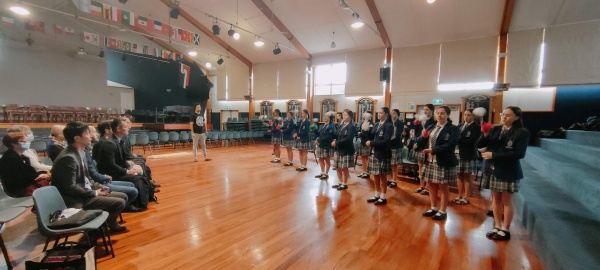
The delegation is welcomed with a powhiri at Napier Girls High School
Misa Kitaoka stressed the importance of destination marketing with support from regional partners.
“While decision-making tends to be institution-led in the tertiary sector, decisions for the school sector are often led by the region or city. This famil was a great opportunity for us to showcase the regions first, followed by the education offerings available in the regions.
“Japanese school students, parents and educators are also interested in cultural experiences in New Zealand beyond education, including the opportunities to interact with local students and host families, and to embrace New Zealand’s cultural values of diversity and inclusion.
“While video-calling offers many benefits and has been vital across the pandemic, bringing famils back into the country means our offshore stakeholders can experience first-hand what New Zealand has to offer. Regional involvement will play a key role in building long-term reciprocal relationships for Aotearoa.”
For more on ENZ’s education partnership with Waseda University and its affiliated schools, please click here.
For more on the value of short-term programmes for international students in New Zealand and the potential benefits to New Zealand and the educator sector, check out this recent Spinoff article: How educational exchange fosters more than just learning | The Spinoff
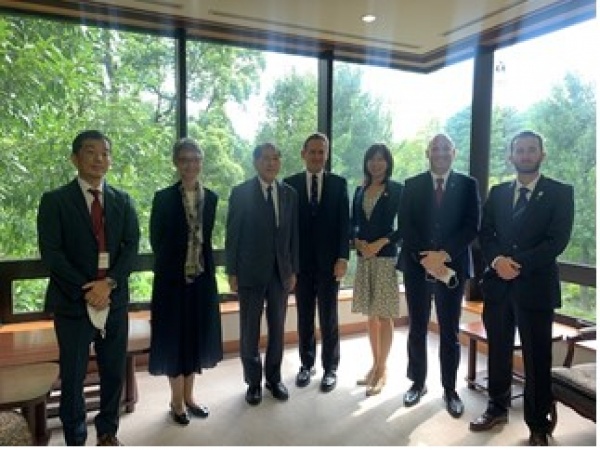
Hamish Cooper, NZ Ambassador to Japan, and ENZ staff Misa Kitaoka, Patrick Holden and Ben Burrowes called on the President of Waseda University, Dr Aiji Tanaka and Prof. Kate Elwood, Dean of Centre for International Education recently to congratulate Dr Tanaka on his reelection as the 18th President of Waseda University
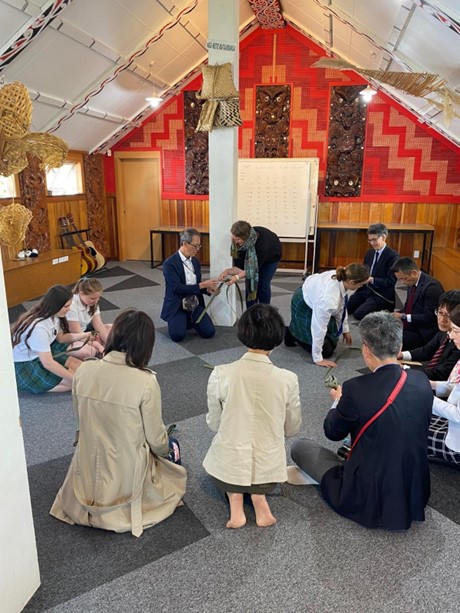
The delegation was welcomed on to the Central Hawkes Bay College Marae where they were given background about the history of the marae and given a quick fire class in flax weaving
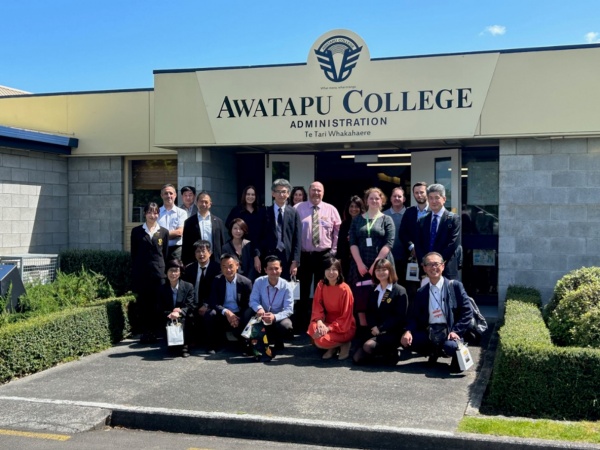
Waseda delegation outside Awatapu College
-
Teaching English in Korea
The temperature drop of over 30 degrees, didn’t deter Christine Black, teacher from James Hargest School in Invercargill from enjoying a unique opportunity to teach a week-long English programme sponsored by the South Korean government.
Black and two other teachers from New Zealand, Elizabeth Henry from Kowhai Intermediate School, in Auckland and Patsy Richardson, from Te Puke School, in the Bay of Plenty were selected to teach the English programme in South Korea.
The teachers were selected through an application process facilitated by ENZ to teach 15 students from throughout South Korea about New Zealand culture and history at the JEI education centre in Cheonan from 19-23 December 2022.
Through the English Language programme funded by the Korean government, New Zealand teachers were invited to Korea to support Korean school students from rural agricultural backgrounds to extend their conversational and speaking skills. The students also engaged in hands-on classroom activities that included mini science experiments.
The one-off 2022 Korea-New Zealand English Language Training Program was sponsored by EPIS, an agency tasked by the Korean government to support English language training for Korean students and facilitated by Korea FAO Association.
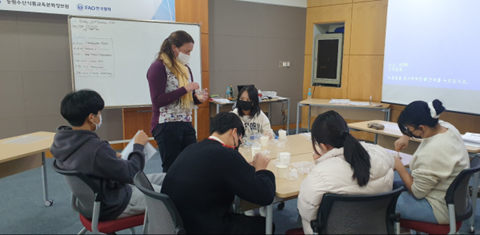
Teacher Christine Black leads the students in an experiment making slime. Photo credit: Korea FAO Association
Yoon Cho, Senior Manager of Korea FAO Association, said it was an experience the students will never forget.
“Well before the teachers arrived, they could feel their passion and enthusiasm for meeting students from rural areas in Korea. I would like to thank the New Zealand teachers who took time to visit Korea at the end of December, especially Christmas week, and made meaningful memories for middle and high school students in Korean rural areas,” Cho said.
School teacher Christine Black was excited for how her first visit to South Korea broadened her understanding of Korean culture.
“It was exciting to travel there to broaden my understanding of this culture as my high school has international students from South Korea. This definitely was a win-win situation to be able to travel somewhere new to me and also share our New Zealand culture.”
As part of the programme, each teacher was responsible for a couple of aspects of New Zealand. Black was responsible for sharing the life of a New Zealand high school student and introduce the different regions of New Zealand and their unique characteristics.
For Patsy Richardson, a teacher at Te Puke School, it was her first time in South Korea, and she introduced waiata to her homeroom group.
“I chose to teach the waiata ‘Tutira mai ngā iwi,’ with actions. We had three 30-minute slots in which to learn it and they had it perfected. Now whether that is because they are willing and diligent students, or I am such a fantastic teacher, is to be debated. The students also performed the waiata at the closing ceremony [for the programme] and it was a great display of cross-cultural connections,” Richardson said.
Despite the short time spent together, it was a great opportunity for the students and teachers to build relationships and cultural understanding between the two countries. The students in Korea were enthusiastic about speaking in English and enjoyed learning some Kiwi slang.
An intermediate school student, Kyungdon Joo, said he studied English and made new friends during the training which gave him a new perspective. “Now I have another goal: To go to New Zealand and learn more about New Zealand.”
For Elizabeth Henry, a teacher from the Auckland region, the English teaching programme was more than the opportunity to enhance language skills. Henry recognised the importance of being a cultural ambassador as she was one of the first New Zealanders the students had ever met.
“I was prepared to bring my best teaching practice to this opportunity prior to the trip not realising that once in Korea, the picture of my purpose there was so much bigger than I had anticipated. Not only did I bring my very best teaching practice to all the students I taught, my mindset changed, thinking one day these children will share this experience with their family and friends.”
Final reflections
Black reflected on the opportunity it provided for the New Zealand teachers as well as students.
“I think it is really important for teachers to grab opportunities like this, especially as there is more and more diversity in our classrooms, and it is important to get first-hand experience of other cultures.”
Henry summed up the English language teaching experience well. She hopes that whenever the students think of New Zealand “a happy memory pops into their mind from this experience.”
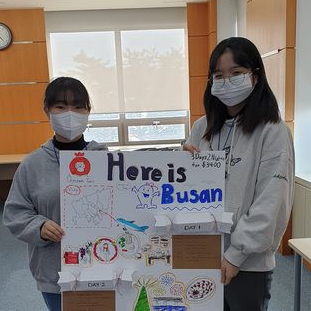
Students present their destination marketing posters Photo credit: Patsy Richardson
Education New Zealand Manapou ki te Ao would like to thank North Asia CAPE and regional education bodies for sharing the opportunity with contacts. This was a one-off overseas short-term teaching programme organised by the South Korean government. ENZ will continue to share these opportunities as they arise with education cooperation partners through the CAPE and regional education channels.


